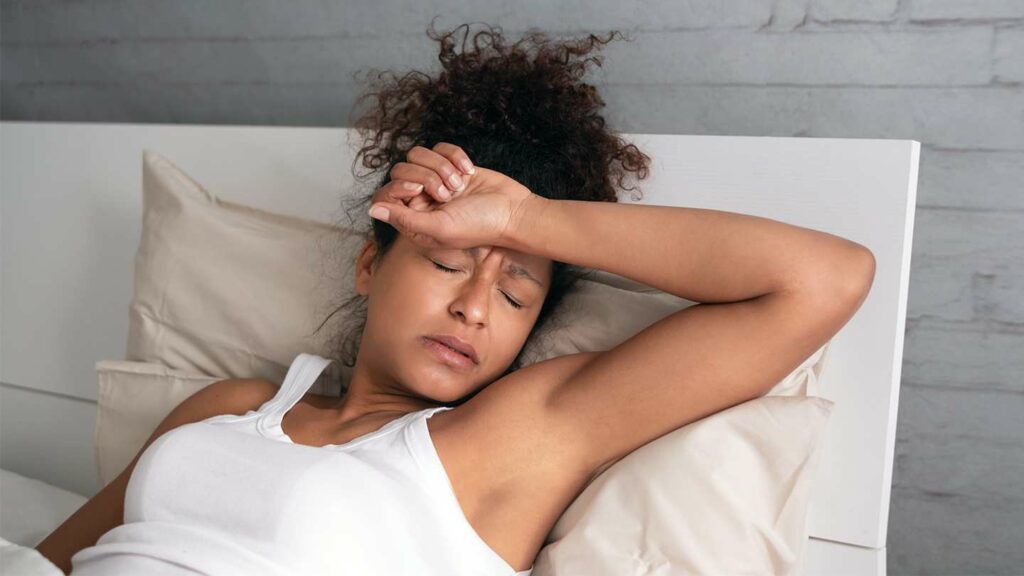Do you find yourself waking up drenched in sweat, tossing, and turning in the middle of the night? Night sweats can be disruptive to your sleep and leave you feeling exhausted and uncomfortable. While there can be various reasons behind this nocturnal perspiration, finding effective remedies is crucial for a restful night’s sleep. In this blog, we’ll explore the natural remedies for night sweats to help you cool down and reclaim your peaceful slumber.
Contents
Why Am I Waking Up Drenched In Sweat?
 Waking up drenched in sweat can be a distressing and uncomfortable experience. Several factors can contribute to night sweats, ranging from benign lifestyle choices to more serious medical conditions. Here are some common reasons why you might be waking up drenched in sweat:
Waking up drenched in sweat can be a distressing and uncomfortable experience. Several factors can contribute to night sweats, ranging from benign lifestyle choices to more serious medical conditions. Here are some common reasons why you might be waking up drenched in sweat:
- Room Temperature and Bedding: Your sleeping environment plays a crucial role. If your room is too warm or if you’re using heavy bedding, you may be overheating during the night.
- Hormonal Changes: Hormonal fluctuations, especially in women experiencing menopause, can lead to night sweats. This is due to changes in estrogen levels.
- Infections and Illness: Fever associated with infections or illnesses can cause excessive sweating during sleep as the body tries to regulate its temperature.
- Medications: Certain medications, such as antidepressants or medications that lower fever, can cause night sweats as a side effect.
- Anxiety and Stress: Mental health factors, such as anxiety and stress, can trigger night sweats. The body’s response to stress may include sweating.
- Sleep Apnea: Sleep apnea, a condition characterized by interrupted breathing during sleep, can lead to night sweats as the body works harder to maintain airflow.
- Hyperhidrosis: Some individuals have a condition called hyperhidrosis, which causes excessive sweating, including during sleep.
- Underlying Medical Conditions: Various medical conditions, such as certain cancers (e.g., lymphoma), autoimmune diseases, or endocrine disorders, can be associated with night sweats.
If you are consistently waking up drenched in sweat and it’s affecting your sleep or quality of life, it’s important to consult with a healthcare professional. They can help identify the underlying cause and recommend appropriate treatments or lifestyle changes to address the issue.
What Are Some Remedies For Night Sweats?
 Experiencing night sweats during menopause can be a challenging aspect of this life stage for many women. Hormonal fluctuations, particularly a decrease in estrogen levels, contribute to these symptoms. Fortunately, various remedies and lifestyle changes can help alleviate night sweats associated with menopause. Here are some suggestions:
Experiencing night sweats during menopause can be a challenging aspect of this life stage for many women. Hormonal fluctuations, particularly a decrease in estrogen levels, contribute to these symptoms. Fortunately, various remedies and lifestyle changes can help alleviate night sweats associated with menopause. Here are some suggestions:
Cooling Bedding and Sleepwear
Investing in cooling bedding and sleepwear can make a significant difference in managing night sweats. Fabrics that wick away moisture, such as cotton or moisture-wicking blends, can help regulate body temperature and provide a more comfortable sleep environment.
Layered Bedding
Layering your bedding allows you to easily adjust your sleep environment to your comfort. Start with lighter layers and add or remove blankets as needed throughout the night. This flexibility can help prevent overheating and excessive sweating.
Stay Hydrated
Proper hydration is essential, especially during menopause. Drink plenty of water throughout the day to stay hydrated, but be mindful of consuming large amounts close to bedtime to minimize disruptions due to bathroom visits.
Healthy Diet
A well-balanced and nutritious diet plays a crucial role in managing menopausal symptoms. Include foods rich in phytoestrogens, such as soy products, flaxseeds, and whole grains, which may have mild estrogen-like effects and help alleviate night sweats.
Regular Exercise
Engaging in regular physical activity is beneficial for overall health and can help manage menopausal symptoms, including night sweats. Exercise regulates hormones, improves mood, and promotes better sleep. Aim for at least 150 minutes of moderate-intensity aerobic activity per week.
Relaxation Techniques
Menopausal symptoms, including night sweats, can be exacerbated by stress. Incorporating relaxation techniques into your daily routine can be beneficial. Deep breathing exercises, meditation, and yoga are effective in reducing stress levels. These practices not only contribute to better emotional well-being but can also positively impact sleep quality.
Temperature Regulation
Maintaining a cool bedroom environment is essential for managing night sweats. Use fans, air conditioning, or open windows to regulate the temperature. Consider using moisture-wicking sheets and breathable fabrics for your sleepwear. Creating a comfortable sleep space can significantly reduce the likelihood and severity of night sweats.
Avoid Triggers
Identify and minimize potential triggers for night sweats. Spicy foods, caffeine, and hot beverages can contribute to increased body temperature and sweating. Limit the intake of these items, especially in the hours leading up to bedtime, to help manage night sweats more effectively.
Herbal Supplements
Some women find relief from menopausal symptoms, including night sweats, through herbal supplements. Black cohosh and evening primrose oil are among the popular choices. However, it’s crucial to consult with your healthcare provider before incorporating these supplements into your routine, as they may interact with other medications or have contraindications based on your health history.
Acupuncture
Acupuncture, an ancient Chinese practice, involves inserting thin needles into specific points on the body. Some women report positive effects on menopausal symptoms, including night sweats, after undergoing acupuncture treatments. While more research is needed to establish its efficacy, consulting with a qualified acupuncturist may provide insights into whether this approach is suitable for you.
Prescription Medications
In cases where night sweats are severe and significantly impact daily life, healthcare providers may prescribe medications such as certain antidepressants (selective serotonin reuptake inhibitors or SSRIs). These medications can help regulate the body’s temperature control mechanisms and alleviate the frequency and intensity of night sweats. It’s crucial to discuss potential side effects, risks and benefits with your healthcare provider to make an informed decision.
It’s important to approach these remedies with a degree of patience and persistence, as the effectiveness of each method can vary from person to person. Consulting with a healthcare provider is essential to develop a personalized plan that addresses your specific symptoms, health history, and lifestyle.
What Foods Stop Night Sweats?
 While specific foods cannot entirely “stop” night sweats, incorporating certain dietary choices may help manage symptoms and contribute to overall well-being during menopause. It’s important to focus on a balanced and healthy diet that includes foods with potential cooling or hormone-regulating properties. Here are some foods that may be beneficial:
While specific foods cannot entirely “stop” night sweats, incorporating certain dietary choices may help manage symptoms and contribute to overall well-being during menopause. It’s important to focus on a balanced and healthy diet that includes foods with potential cooling or hormone-regulating properties. Here are some foods that may be beneficial:
- Soy Products
Soy contains phytoestrogens, which are plant compounds that mimic the effects of estrogen in the body. Foods like tofu, soy milk, and edamame may have mild estrogen-like effects and could help alleviate menopausal symptoms, including night sweats.
- Flaxseeds
Flaxseeds are rich in lignans, another type of phytoestrogen. Incorporating ground flaxseeds into your diet may help regulate hormonal fluctuations and reduce the severity of night sweats.
- Whole Grains
Whole grains, such as brown rice, quinoa, and oats, provide complex carbohydrates that contribute to overall health. They can help stabilize blood sugar levels. And, potentially reducing the risk of night sweats triggered by blood sugar fluctuations.
- Fruits and Vegetables
Include a variety of fruits and vegetables in your diet, as they are rich in vitamins, minerals, and antioxidants. These nutrients support overall health and may help manage symptoms associated with menopause.
- Cold-Water Fish
Fatty fish like salmon, mackerel, and sardines are excellent sources of omega-3 fatty acids. Omega-3s have anti-inflammatory properties and may contribute to hormonal balance, potentially reducing the severity of menopausal symptoms.
- Nuts and Seeds
Nuts and seeds, such as almonds and sunflower seeds, provide healthy fats, vitamins, and minerals. They can be a nutritious snack that supports overall well-being during menopause.
- Dairy Products
Calcium-rich dairy products like yogurt and milk contribute to bone health. Additionally, some studies suggest that a higher intake of calcium and vitamin D may be associated with a reduced risk of certain menopausal symptoms.
- Herbs and Spices
Certain herbs and spices, such as black cohosh and sage, have been traditionally used to manage menopausal symptoms. Including them in your meals or consuming them as herbal teas may offer some relief.
It’s essential to emphasize an overall balanced and varied diet rather than relying on specific foods alone. Additionally, staying hydrated and avoiding trigger foods, such as caffeine, spicy foods, and alcohol, close to bedtime may help minimize night sweats. However, individual responses to dietary changes can vary. So it’s advisable to consult with a healthcare provider or a registered dietitian for personalized advice based on your health and nutritional needs.
Conclusion
In conclusion, managing night sweats during menopause involves a holistic approach that combines lifestyle adjustments, dietary choices, and potential medical interventions. From creating a cool sleep environment with breathable bedding to incorporating soy products and flaxseeds with hormone-regulating properties into your diet, there are various strategies to explore. Additionally, relaxation techniques, regular exercise, and, when necessary, consultation with healthcare professionals can contribute to finding relief.
While each woman’s experience is unique, a personalized combination of these remedies for night sweats may offer a more comfortable and restful night’s sleep during the menopausal transition. Remember, it’s crucial to consult with your healthcare provider to tailor these approaches to your individual needs and health considerations. Sweet dreams await on your journey to a more comfortable night’s sleep! If you are facing menopause-related issues, menopause treatment at HerMantra can help. Book your free trial online menopause treatment session now.


